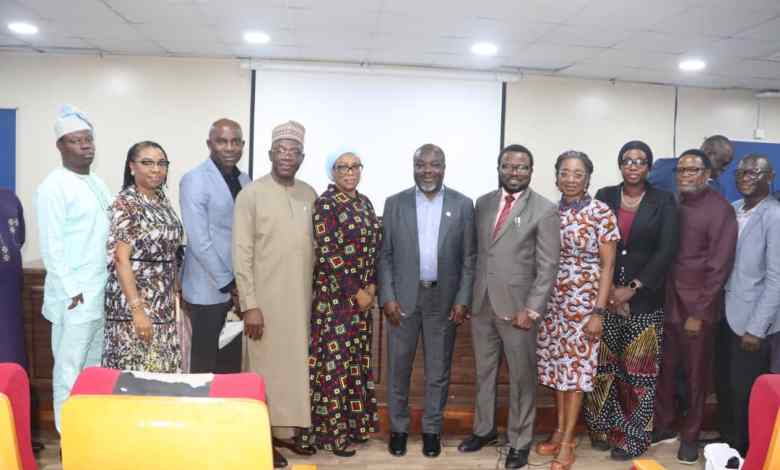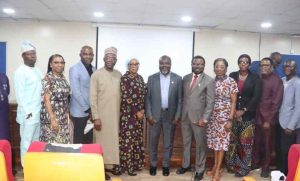
FMOH, PARTNERS SEEK SUPPORT FOR 2025 LAGOS ART IMPACT SURVEY

A delegation from the National HIV/AIDS, Viral Hepatitis, and Sexually Transmitted Infections Control Programme (NASCP) of the Federal Ministry of Health made an advocacy visit to the Lagos State Ministry of Health today in a significant move to bolster HIV intervention efforts in Lagos State.
Prominent national health organizations such as the Nigeria Center for Disease Control (NCDC), the National AIDS Control Agency (NACA), and the President’s Emergency Plan for AIDS Relief (PEPFAR) via the U.S. Centers for Disease Control and Prevention (CDC) and APIN Public Health Initiatives were represented in the delegation.
The purpose of this advocacy visit was to lay the groundwork for the upcoming 2025 Population-based Antiretroviral Therapy (ART) Impact Survey (AIS) implementation in Lagos State.
Permanent Secretary of the Lagos State Ministry of Health, Dr. Olusegun Ogboye along with key figures from the State health sector, welcomed the delegation. Among those present were the Permanent Secretary, Lagos Health District II, Dr. Dayo Lajide, Permanent Secretary, Lagos Health District V, Dr. Dapo Asiyanbi, Permanent Secretary, Lagos Health District VI, Dr. Abimbola Mabogunje, and the Chief Executive Officer of the Lagos State AIDS Control Agency (LSACA), Dr. Folakemi Animashaun. The AIS aims to evaluate the effectiveness of ART and monitor critical HIV-related indicators across the state.
Dr. Ogboye expressed gratitude for the collaborative efforts, emphasising the importance of a data-driven approach in addressing the HIV epidemic in Lagos. He noted that the survey would involve approximately 4,000 households, reaching an estimated 8,000 individuals
aged 15 to 64.
He pointed out that Lagos is ideally situated to serve as a model for other states because of its economic clout and leadership in public health, making it a strategically significant site for the study. The 2018 Nigeria AIDS Indicator and Impact Survey, which established a baseline for comprehending HIV prevalence and viral suppression throughout Nigeria, is where the AIS got its start. More than 170,000 people in Lagos State are HIV positive, with a 1.4% prevalence rate. The forthcoming survey, Dr. Ogboye noted, would help gauge progress against these earlier findings and be in line with the UNAIDS 95-95-95 targets, which seek to guarantee that 95% of people living with HIV receive a diagnosis, treatment, and viral suppression.
Dr. Ogboye emphasised the potential impact of the AIS on Lagos’s public health landscape, stating, “This survey is more than just a data collection effort; it’s a commitment to every resident affected by HIV in our state. We are dedicated to providing a foundation
that allows every individual living with HIV to thrive with dignity and support.”
Representative from NACA and PEPFAR echoed the call for a collaborative approach, with the latter announcing that Ambassador John Kanga, Global AIDS Coordinator and Senior Bureau Official for Global Health Authority, would visit Lagos in December. Kanga’s visit, according to a PEPFAR representative, is expected to emphasise sustainability in Nigeria’s HIV response, underscoring Lagos State’s commitment to owning and maintaining the progress made.
The Deputy Director of the NCDC’s Public Health Laboratory, Dr. Amos Dangana said, “The AIS is a critical tool for collecting biological and behavioural data that is essential for monitoring and managing HIV transmission”. He added that the initiative would help
improve testing coverage and better understand HIV prevalence across Nigeria.
Dr. Jay Osi Samuel, the Principal Investigator for the PHIS3 Project and Deputy CEO of Programs for APIN Public Health Initiatives, provided further details on the function of community participation throughout the conference. He emphasized that strong community involvement, trust, and cooperative collaborations with local stakeholders are essential to the AIS’s success, especially when it comes to gaining access to the chosen houses and guaranteeing data veracity.
Lagos’ continued support for foreign health programs was also praised by PEPFAR’s delegate, who pointed out the state’s commitment to fulfilling Global Fund counterpart financing criteria in spite of other urgent health issues. She claimed that this pledge showed the state’s determination to combat HIV and AIDS in a thorough and long-term manner.
As part of the AIS process, the Lagos State Ministry of Health, with its federal and international partners, will conduct laboratory assessments, community mapping, and targeted advocacy. Training sessions and site assessments are scheduled between November 3
and 9, 2024. The survey itself will gather detailed data, including viral load suppression rates, HIV prevalence, and demographic information that will help inform future health interventions.
Nigeria’s aim to eradicate HIV as a public health threat by 2030 is advanced by the advocacy visit. Lagos reaffirms its status as a leader in data-driven, effective public health programs as it gets ready to launch this ambitious survey.
It is anticipated that the results of the 2025 AIS will have a major impact on how Nigeria responds to HIV and how health initiatives continue to meet the changing needs of impacted communities.
